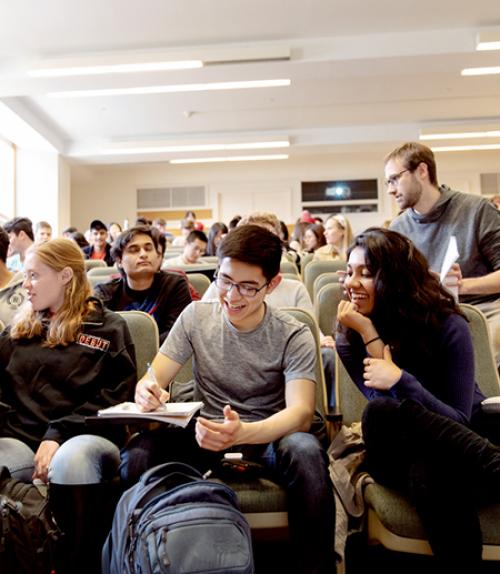A project funded by a 2017 grant from the provost’s Active Learning Initiative has resulted in calculus students and instructors seeing academic benefits, and a path to more consistently active pedagogy.
Steve Bennoun, active learning lecturer in mathematics and coordinator of the project, published the results of the transformation in a paper, “Establishing Consistent Active Learning in a Calculus I Course.” Tara Holm, professor of mathematics, co-authored the report.
In 2017, Bennoun created a set of pre-class and in-class teaching materials for all faculty to use in Introductory Calculus I (MATH 1110). This eliminated the need for each faculty member to develop their own teaching materials, allowing them to focus on teaching.
Bennoun developed worksheets to guide students through thinking about the context and concepts being taught. Students used the worksheets to move gradually toward using the concepts in new situations. Bennoun divided the activities into small modules for group work, with input from the instructor. He also designed the materials so instructors could adapt them to their teaching needs.
The department tested the materials in spring 2018 and implemented them more broadly the following semester. With changes made between spring and fall – including more training for both faculty and graduate student teaching assistants – Bennoun and Holm began to see a shift in the classroom toward more active learning strategies.
The math department plans to continue using the active learning framework this fall, with some adaptations for socially distanced teaching.
One overarching goal was to create a more unified student experience in a course that has as many as 12 different instructors. Another impetus for the change was aligning the class experience with homework and exams, meaning class time had to have a conceptual rather than computational focus.
“We wanted all students to experience being guided through some of the conceptual framework,” Holm said, “rather than having to fight with that themselves.”
The department also saw changes on the student side. Students liked being able to talk over the work with their peers, saying they felt less afraid of making mistakes than they did when working through problems with the instructor.
Also, professor and department chair Ravi Ramakrishna ’88 noticed how lively discussions were when he observed classes. “You walk in and someone is teaching the class,” he said. “They give a worksheet and then, boom, the class just comes to life.”
Bennoun saw the grant as a catalyst for these changes.
“There was already a core of faculty interested in teaching development,” he said, “but the grant made more people aware of it: more attention, new people, new things happening. Sometimes it just takes something little to get things moving.”
Ramakrishna, a Stephen H. Weiss Presidential Fellow, said that with a rotating teaching team, the department must “make it adaptable to a different set of people every couple of years; it’s going to constantly change.”
The Active Learning Initiative, developed within the College of Arts and Sciences with initial support from Alex and Laura Hanson ’87, is supported by Cornell’s Office of the Vice Provost for Academic Innovation and the Center for Teaching Innovation.
Read the story in the Cornell Chronicle.




